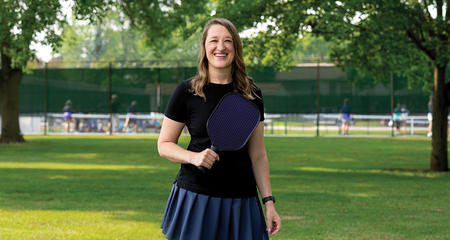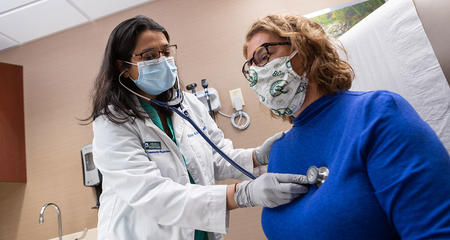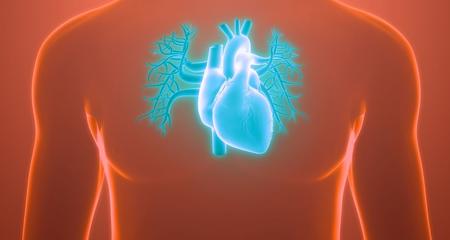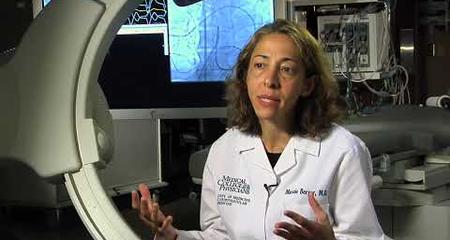To diagnose arrhythmia and atrial fibrillation (AFib or AF), we need to see the "electrical" blueprint of the heart's rhythm. This can most easily be diagnosed with a simple EKG – a 10-second strip of the heart rhythm. This only works if we do the EKG when the patient is actively in AFib. If a patient thinks they have a-b that comes and goes, we can provide a patient with a longer monitor in the form of a sticky patch on the chest which you wear for 24 hours, 48 hours or 30 days. The length or monitoring time depends on how likely we are to capture the heart rhythm in the allotted time period. If you already have a pacemaker or implantable cardioverter defibrillator (ICD), we may find irregular heart rhythms in the data recordings.
Tests frequently used to diagnose arrhythmias and AFib include:
- Electrocardiogram (EKG, ECG), a recording of electrical activity in the heart. We perform thousands of electrocardiography procedures each year. Sometimes a device is used to obtain a specialized electrocardiogram, including:
- Holter monitor, a device that records heart rhythms over 24-48 hours
- Event recorder or loop recorder, devices that record irregular heart rhythm episodes over extended periods of time
- Electrophysiology study (EP study), an invasive procedure that tests the heart's electrical system. EP studies may be performed to help evaluate the effectiveness of medications, to “map” or locate the point of origin of a dysrhythmia, or to gather other important details about the patient’s condition.
- Tilt table test, used to determine the cause of syncope, or fainting. While physicians monitor the patient’s electrocardiogram and blood pressure, they attempt to cause an episode of syncope in the patient by using a tilt table to create changes in posture from lying to standing.
- Cardiac MRI (cardiac magnetic resonance imaging), a procedure used to diagnose a variety of arrhythmias. The procedure uses a combination of a large magnet, radiofrequencies, and a computer to produce detailed images of the heart. This is an important test for diagnosing conditions related to arrhythmogenic right ventricular dysplasia (ARVD), cardiomyopathy and AFib.
- Echocardiogram (“echo”), an ultrasound test that uses sound waves to take images of the heart in motion. The test helps assess the heart’s structure and function. Our state-of-the-art Echocardiography Laboratory performs thousands of echo procedures a year, including:
- Transthoracic echocardiogram (TTE)
- Transesophageal echocardiogram (TEE)
- Intracardiac echocardiogram (ICE)
- Echo-optimized Cardiac resynchronization therapy (CRT) evaluation
Genetic Testing for Inherited Cardiomyopathies
Our electrophysiologists work closely with a cardiac geneticist who are available to determine if a patient has an inherited cardiomyopathy condition. Testing can confirm a diagnosis in someone showing signs of the condition. It can also identify family members at risk of developing the condition later in life so they can be screened regularly and treated as soon as heart changes begin to appear.
Electrophysiology Laboratory
Patients from around Wisconsin and northern Illinois are referred to us for electrophysiology testing in our electrophysiology laboratory.
The electrophysiology lab (EP lab) is equipped to diagnose common and complex electrical disturbances of the heart (arrhythmias).
Froedtert & MCW electrophysiologists (cardiologists with special training and board certification in cardiac electrophysiology) specialize in the diagnosis of arrhythmias.
The EP lab uses state-of-the-art digital fluoroscopy, computerized three-dimensional cardiac mapping equipment, and intravascular ultrasound to visualize of structures of the heart.
Virtual Visits Are Available
Safe and convenient virtual visits by video let you get the care you need via a mobile device, tablet or computer wherever you are. We'll assess your condition and develop a treatment plan right away. To schedule a virtual visit, call 414-777-7700.
More to Explore





